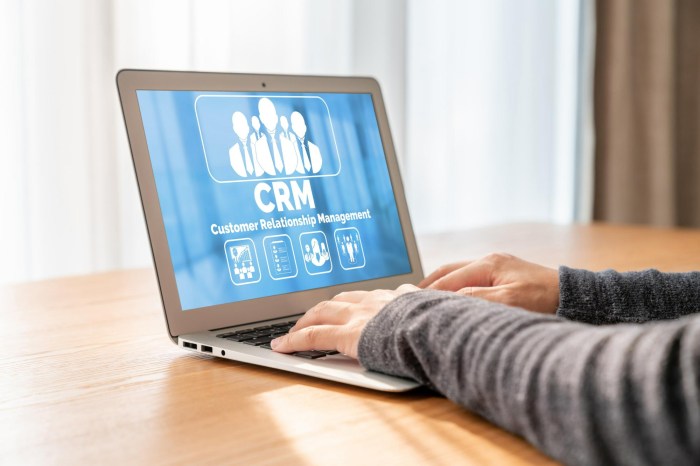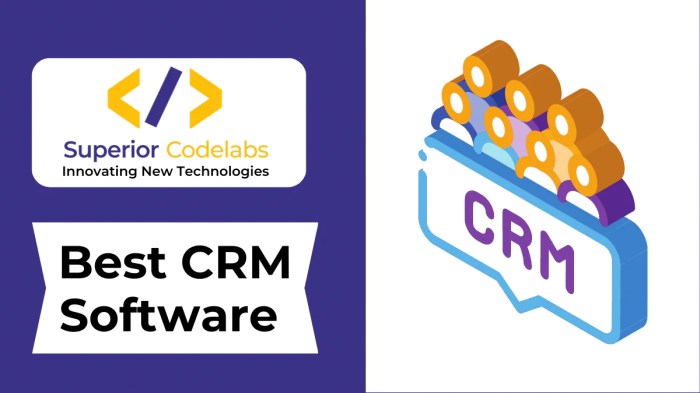Crm software and services – In today’s competitive business landscape, managing customer relationships effectively is paramount. Customer Relationship Management (CRM) software and services provide the tools and strategies to streamline processes, enhance customer interactions, and ultimately drive revenue growth. This comprehensive guide delves into the intricacies of CRM, exploring its various facets, benefits, and considerations for businesses of all sizes.
Understanding CRM Software: More Than Just a Contact List
CRM is far more than a simple contact list. It’s a sophisticated system designed to centralize and manage all interactions with current and potential customers. This encompasses everything from initial contact and lead nurturing to sales conversion, customer support, and ongoing engagement. A robust CRM system provides a single source of truth, ensuring everyone in your organization has access to the same, up-to-date information.
Key Features of Effective CRM Systems:, Crm software and services
- Contact Management: Store and organize detailed customer information, including contact details, purchase history, and interaction logs.
- Lead Management: Track leads from initial inquiry to conversion, automating follow-up and nurturing processes.
- Sales Management: Manage sales pipelines, track opportunities, and forecast revenue with greater accuracy.
- Marketing Automation: Automate marketing tasks such as email campaigns, social media posting, and personalized messaging.
- Customer Service & Support: Manage customer inquiries, track support tickets, and improve response times.
- Reporting & Analytics: Gain valuable insights into customer behavior, sales performance, and marketing effectiveness.
- Integration Capabilities: Seamlessly integrate with other business applications, such as email marketing platforms, e-commerce systems, and accounting software. This integration is crucial for a truly unified view of the customer journey.
Types of CRM Software: Finding the Right Fit
The CRM market offers a diverse range of solutions, each tailored to specific business needs and sizes. Understanding the different types is crucial for selecting the most appropriate system.
1. Operational CRM
Focuses on improving internal business processes related to customer interactions. This often includes sales force automation (SFA), marketing automation, and customer service automation.
2. Analytical CRM
Emphasizes data analysis and reporting to gain insights into customer behavior and preferences. This data-driven approach helps businesses make informed decisions to improve customer satisfaction and loyalty.
3. Collaborative CRM
Facilitates communication and collaboration among different departments within a company to provide a consistent and unified customer experience. This ensures everyone is on the same page, regardless of their role.
4. Cloud-Based CRM (SaaS)
Software as a Service (SaaS) CRM solutions are hosted on the cloud, eliminating the need for on-premise infrastructure and IT management. This offers scalability, accessibility, and cost-effectiveness.
5. On-Premise CRM
Traditional CRM systems installed and maintained on a company’s own servers. This provides greater control but requires significant investment in hardware, software, and IT expertise.
Benefits of Implementing a CRM System
Investing in a CRM system offers numerous advantages that contribute to significant business growth.
- Improved Customer Relationships: Personalized interactions and better understanding of customer needs lead to stronger relationships and increased loyalty.
- Increased Sales Revenue: Streamlined sales processes, improved lead management, and efficient sales forecasting contribute to higher revenue generation.
- Enhanced Customer Service: Faster response times, efficient issue resolution, and personalized support improve customer satisfaction and reduce churn.
- Improved Marketing ROI: Targeted marketing campaigns, automated processes, and data-driven insights optimize marketing spend and maximize returns.
- Better Data Management: Centralized data storage and easy access to customer information eliminate data silos and improve decision-making.
- Increased Efficiency and Productivity: Automation of repetitive tasks frees up employees to focus on higher-value activities.
- Improved Team Collaboration: Shared access to customer information and streamlined communication enhance teamwork and collaboration.
Choosing the Right CRM for Your Business
Selecting the right CRM involves careful consideration of several factors:
- Business Size and Needs: Choose a system that aligns with your current and future business requirements.
- Budget: Consider both initial investment and ongoing costs, including licensing fees, implementation, and training.
- Integration Capabilities: Ensure the CRM integrates seamlessly with your existing business applications.
- Scalability: Choose a system that can adapt to your business growth and evolving needs.
- User-Friendliness: Select a system with an intuitive interface that is easy for your team to learn and use.
- Customer Support: Choose a vendor that offers reliable and responsive customer support.
Popular CRM Software and Services:
The market is flooded with options, ranging from comprehensive enterprise solutions to simpler, more affordable options for small businesses. Some popular choices include Salesforce, HubSpot, Zoho CRM, Microsoft Dynamics 365, and Freshsales. Each offers a unique set of features and pricing models. Researching reviews and comparing features is essential before making a decision.
Implementing and Managing Your CRM System: Crm Software And Services
Successful CRM implementation requires careful planning and execution. This includes:
- Defining clear objectives: Establish specific, measurable, achievable, relevant, and time-bound (SMART) goals for your CRM implementation.
- Data migration: Accurately transfer existing customer data to your new CRM system.
- User training: Provide comprehensive training to your team to ensure they can effectively use the system.
- Ongoing maintenance and updates: Regularly update your CRM system and address any issues promptly.
- Performance monitoring and optimization: Track key metrics to assess the effectiveness of your CRM system and make necessary adjustments.
Frequently Asked Questions (FAQ)
- Q: How much does CRM software cost? A: CRM pricing varies widely depending on the vendor, features, and number of users. Expect a range from free options for small businesses to enterprise-level solutions costing thousands of dollars per month.
- Q: How long does it take to implement a CRM system? A: Implementation time depends on the complexity of the system and the size of your business. It can range from a few weeks to several months.
- Q: What are the key metrics to track with a CRM? A: Key metrics include customer acquisition cost (CAC), customer lifetime value (CLTV), conversion rates, customer churn rate, and sales cycle length.
- Q: Can I integrate my CRM with other software? A: Most modern CRM systems offer robust integration capabilities with other business applications, such as email marketing platforms, e-commerce systems, and accounting software.
- Q: What is the return on investment (ROI) of a CRM system? A: The ROI of a CRM system can be significant, resulting in increased sales, improved customer satisfaction, and reduced operational costs. However, the actual ROI varies depending on the business and the effectiveness of implementation.
Conclusion
CRM software and services are essential tools for businesses seeking to enhance customer relationships, streamline operations, and drive growth. By carefully selecting the right system and implementing it effectively, businesses can unlock significant advantages in today’s competitive market. Don’t hesitate to explore the various options available and choose the solution that best aligns with your specific needs and goals.
References:
Call to Action:
Ready to transform your customer relationships and unlock your business’s full potential? Contact us today for a free consultation to discuss your CRM needs and explore the best solution for your business!

Source: capitaldistrictdigital.com
Query Resolution
What is the difference between cloud-based and on-premise CRM?
Cloud-based CRM is hosted on a third-party server, accessible anywhere with internet access. On-premise CRM is installed and maintained on the company’s own servers.
How much does CRM software typically cost?

Source: superiorcodelabs.com
Pricing varies widely depending on features, functionality, and the number of users. Options range from free plans for small businesses to enterprise solutions costing thousands of dollars per month.
What are some key features to look for in CRM software?
Essential features include contact management, sales pipeline management, marketing automation, reporting and analytics, and customer support tools.
How long does it take to implement CRM software?
Implementation time depends on the complexity of the system and the size of the business. It can range from a few weeks to several months.
